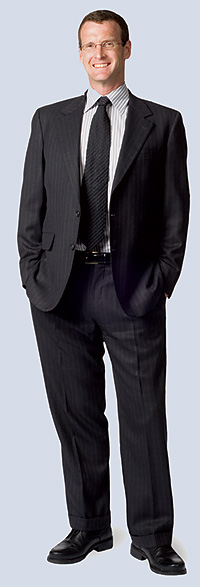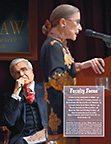Introducing Roderick M. Hills Jr.
William T. Comfort, III Professor of Law
Printer Friendly Version  Rick Hills, 42, may very well be the only professor who has had to find a home for his farm animals (goats, a sheep, a pony, chickens and his horse, Reflector) before taking a job at the Law School. Should New Yorkers find that odd, the quick-witted Hills, an expert in federalism and constitutional law, quips: “Thank God we here in Michigan are not governed by a bunch of blue-state New Yorkers who don’t understand the importance of livestock.” Seizing an opportunity to teach by example, he adds: “That’s what I mean by federalism. The cultural divergence between different regions makes it disastrous to attempt to impose a single system of legislation on the nation.”
Rick Hills, 42, may very well be the only professor who has had to find a home for his farm animals (goats, a sheep, a pony, chickens and his horse, Reflector) before taking a job at the Law School. Should New Yorkers find that odd, the quick-witted Hills, an expert in federalism and constitutional law, quips: “Thank God we here in Michigan are not governed by a bunch of blue-state New Yorkers who don’t understand the importance of livestock.” Seizing an opportunity to teach by example, he adds: “That’s what I mean by federalism. The cultural divergence between different regions makes it disastrous to attempt to impose a single system of legislation on the nation.”
Hills, who taught for 12 years at the University of Michigan Law School, joins NYU in September to teach Land Use Regulation and The Administrative and Regulatory State. The son of prominent D.C. Republicans—his father, Roderick M. Hills Sr., was the former chairman of the U.S. Securities and Exchange Commission (1975-77) and counsel to President Gerald Ford; his mother, Carla Hills, was secretary of the Department of Housing and Urban Development during the Ford administration and U.S. Trade Representative under George H.W. Bush’s administration—Hills eschewed politics, making a name for himself in constitutional law. His research focuses on the costs and benefits of decentralizing public power. “His learning and practical knowledge range across every level of government, from local governments to state governments to the national government,” says Richard Pildes, the Sudler Family Professor of Constitutional Law. “I know of no one else who contributes on the great constitutional issues of our time and who also attends local zoning hearings, just out of intellectual curiosity and a desire to understand the practical workings of government.”
Hills’s recent work hints at his range. In his forthcoming essay, “Compared to What? Tiebout and the Comparative Merits of Congress and the States in Constitutional Federalism,” he tackles the issue of government subsidies for industry. In another upcoming book chapter called “Sex, Drugs, God and Federalism,” Hills examines the outcome of the 1648 Peace of Westphalia to determine the role that federalism played in defusing conflicts over religion and culture. Professor Don Herzog of the University of Michigan Law School hails the piece as Hills’s “best work yet,” predicting that “this will be a gigantic piece of scholarship.”
The second of four children, Hills spent his earliest years in Los Angeles before moving to Washington, D.C., when he was 10. As a teen, Hills played with the Peabody Youth Chamber Orchestra. “I was a super cello nerd in high school,” says Hills, who began his undergraduate studies at Yale University majoring in music. He eventually switched to history, with an emphasis on British intellectual history and German idealist philosophy, earning his B.A. in 1987. After graduation, he enrolled in the Committee on Social Thought, an interdisciplinary program in the humanities at the University of Chicago. He’d intended to go for his Ph.D., but quit to follow his then-fiancée, Maria Montoya, to Yale. While she studied history, he entered Yale Law School, reluctantly at first. “I had no interest in being a lawyer at the time,” he says. There were too many lawyers already in his family. His parents had founded the California law firm of Munger, Tolles & Hills in 1962, and two of his three sisters were lawyers. But, “once I got to law school, I loved it.” After earning his J.D. in 1991, he clerked in Dallas, Texas, for Judge Patrick Higginbotham of the U.S. Court of Appeals for the Fifth Circuit. After the clerkship, Montoya landed a job teaching history at the University of Colorado, and Hills followed his wife again—teaching at the law school and practicing at the Law Office of Jean Dubofsky, where the lawyers worked primarily on appellate briefs. There he second-chaired, and won, the famous gay civil rights litigation Romer v. Evans. He went on to teach at Michigan in 1994, where Montoya also became a professor. “It was a challenge for both of us to be working towards tenure while raising our two daughters,” Hills says. “But it helped that our work overlapped so much: Maria’s book was on 19th century struggles for land in the American West, so she was writing on local political corruption and property law—two of my favorite topics. We read each other’s drafts and learned from each other’s research.”
“Having spent 12 years in a medium-size college town,” says Hills, “we’re ready to live in, and expose our daughters to, the new environment of a major city.” He is no doubt also looking forward to having a new city and state government to examine through the lens of federalism. Montoya, 42, will teach history at NYU. Their children, Emma, 14, and Sarah, 12, presumably will have fewer chores since they will no longer have to feed and care for Reflector and the gang.
—
